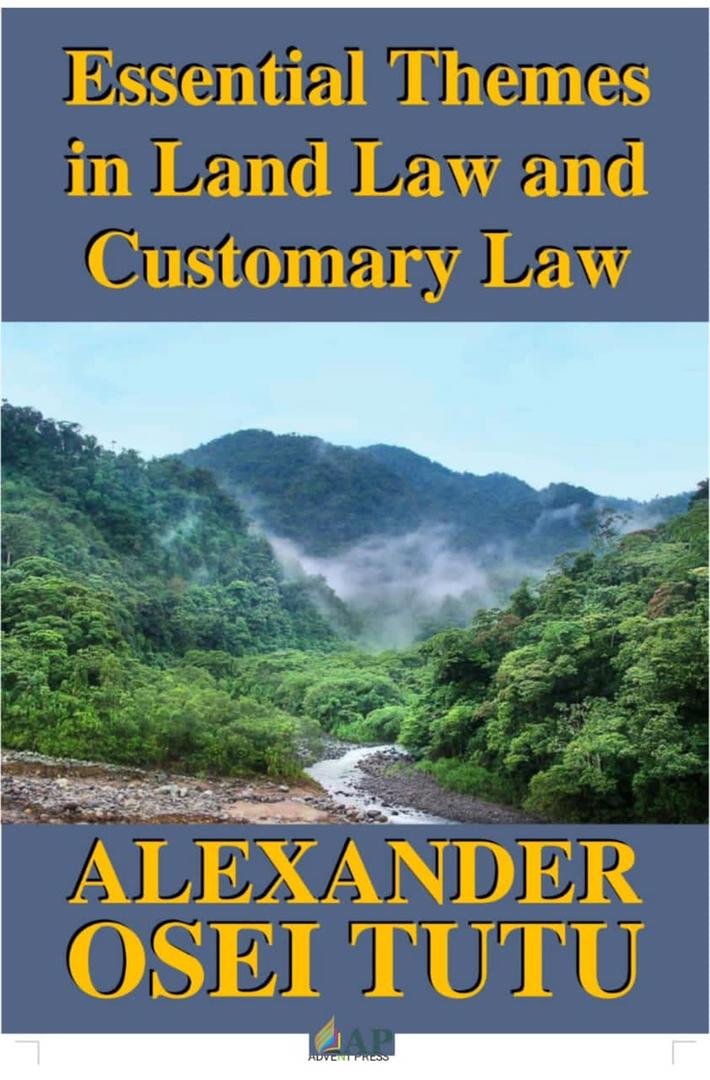Dissecting Ghana’s New Land Act, (Act 1036) in Justice Alexander Osei Tutu’s new book
Dissecting Ghana’s New Land Act, (Act 1036) in Justice Alexander Osei Tutu’s new book

Justice Alexander Osei Tutu’s soon to be launched book, Essential Themes in Land Law and Customary Law is described by the venerable Justice Jones Dotse as ‘a living and authoritative scholarly work which has put on the surgical table the new Land Act of 2020 (Act 1036) in relation to the practice of the law in the Courts.’
By this description, it’s without doubt that the book speaks at length to the various provisions of Act 1036 and their application by the Courts.
The New Land Act (Act 1036) passed in 2020 of December is touted as an innovation from the old. The implementation of the progressive features of the Act is expected to enhance the administrative framework of land registration, security, and governance in Ghana.
The key features hold that chiefs, tendanas, clan heads, family heads or any authority/custodian in charge of the management of stool or skin, clan or family lands are accountable as fiduciaries, and hence, are subject to disciplinary sanctions if they fail to comply with such duties.
The Act also requires custodians of lands to establish a Customary Land Secretariat for the management of their respective lands. It, therefore, sets out guiding provisions that detail the structure, functions, staffing, powers, and source of funds of these Customary Land Secretariats.
Under the Act, there are now three systems of recording and registering land and interests in land. These are: (1) Recording of customary interests and rights by Customary Land Secretariats; (2) Registration of instruments relating to land; and (3) Registration of title, interests and rights in land.
The Act has also introduced electronic conveyancing where land or interests in land can now be transferred by an electronic information system.
Parties in land disputes are required to exhaust all procedures under the Alternative Dispute Resolution Act, 2010 (Act 798) before any action involving land can commence in Court.
In Justice Osei Tutu’s book, he captures the complexities around the role of the tendana in modern Ghana, an area not recognized under Act 1036. Additionally, he points out that section 13 of the New Land Act bears similar wording to Article 36 (8) of the 1992 Constitution and explains how the Act ultimately seeks to satisfy the provisions of the Constitution.
Much of the author’s acute analysis and comments deal with the topic of the Customary Land Secretariat, the much-debated problem of the scope and limitation of provisions on spousal property rights, Statutory Declarations in land litigation, Alternative Dispute Resolution in land litigation, Constitutionality of Restrictions, Reformulation of the provisions of Re-entry and Forfeiture and the contentious debate of whether the Circuit Courts have the same jurisdiction in land matters as the High Courts.
The book’s authoritativeness also speaks to the author’s expertise in these matters. It’s noteworthy that Justice Alexander Osei Tutu, currently a Justice of the High Court and of the Gambia, presided over the Lands Court in Accra and Tema for over four years (between 2015 and 2019).
Further to that, he’s had great experience in the area of Alternative Dispute Resolution (ADR), one of the key features of the new Land Act for settling land disputes. He was appointed by Gambian’s Chief Justice to serve on a seven-member ADR committee.
The book is equally reviewed by notable names within the legal fraternity. Yaw Boafo, President of the Bar Association said: “I have had the privilege to peruse through this book by the learned author, Justice Osei Tutu. And I have one adjective to describe the book: ‘IMPRESSIVE’!
Dean of the UPSA Faculty of Law, Professor Kofi Abotsi said: “Justice Alexander Osei Tutu demonstrates a finesse in legal thinking that few can match.”
While the Dean of the KNUST Faculty of Law, Dr. Ernest Owusu-Dapaa describes it as “a great work that must certainly be read by everyone who is determined to appreciate recalibration of many areas of Ghanaian law in contemporary times.”
The foreword written by Justice Jones Dotse observes that it is a “comprehensive work detailing from the author’s perspectives and analyzes the narrative of previous scholarly works by Ollenu JSC and others and especially the many authoritative decisions of the Superior Courts.
The book is set to be launched on May 24, 2022, at the High Court Complex in Accra.


